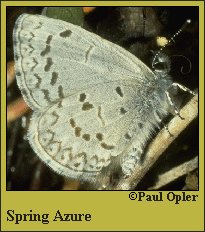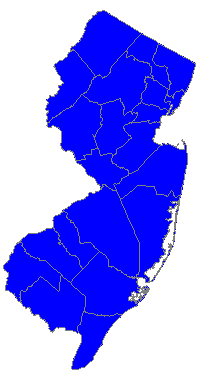 |
 

 |



Spring Azure (Celastrina "ladon" [Cramer])
Wing span: 7/8 - 1 3/8 inches (2.2 -3.5 cm).
Identification: Seasonally variable and sexually dimorphic. Upperside of males blue, females with some black at outer edge of forewing. Late spring and summer forms with white above. Underside hindwing gray-white with faded small black dots, darker gray with larger black spots, or with blotches and black margins in the center.
Life history: Males patrol and perch all day but are most active from midafternoon until dusk. Eggs are laid on flower buds. Caterpillars feed on flowers and fruits and are tended by ants. Chrysalids hibernate.
Flight: Many broods from January-October along the Gulf Coast; progressively shorter flights northward; May-August in Canada.
Caterpillar hosts: Flowers of a variety of woody shrubs and occasionally herbs including dogwood (Cornus florida), New Jersey tea (Ceanothus americana), meadowsweet (Spiraea salicifolia), and Collinsia.
Adult food: Flower nectar from dogbane, privet, New Jersey tea, blackberry, common milkweed, and many others.
Habitat: Openings and edges of deciduous woods, old fields, wooded freshwater marshes and swamps.
Range: Alaska and Canada south of the tundra through most of the United States except the Texas coast, southern plains, and peninsular Florida; south in the mountains to Columbia.
Conservation: This species comprises a complex of 4-5 separate species, some of which may be of conservation concern.
Management needs: None reported.
Note: In addition to the Appalachian Azure, Atlantic Holly Azure, Dusky Azure, and Hops Azure, this "species" is in reality still a complex of additional species whose identity is under current research. At present it is not possible to separate all of the records for these species into individual species maps. We look forward to doing this in the future.
References:
Opler, P. A. and G. O. Krizek. 1984. Butterflies east of the Great Plains. Johns
Hopkins University Press, Baltimore. 294 pages, 54 color plates.
Opler, P. A. and V. Malikul. 1992. A field guide to eastern butterflies. Peterson
field guide #4. Houghton-Mifflin Co., Boston. 396 pages, 48 color plates.
Scott, J. A. 1986. The butterflies of North America. Stanford University Press,
Stanford, Calif. 583 pages, 64 color plates.
Tilden, J. W. 1986. A field guide to western butterflies. Houghton-Mifflin Co.,
Boston, Mass. 370 pages, 23 color plates.
Author: Jane M. Struttmann
State and Regional References:
Glassberg, J. 1993. Butterflies Through Binoculars: A Field Guide to
Butterflies in the Boston-New York-Washington Region. Oxford Univ. Press,
New York, N.Y. 160 pp.
Gochfeld, M. and Burger, J. 1997. Butterflies of New Jersey - A Guide to
Their Status, Distribution, Conservation, and Appreciation. Rutgers Univ.
Press, New Brunswick, N.J. 327 pp.
Iftner, D.C. and Wright, D.M. 1996. Atlas of New Jersey Butterflies. Special
Private Publication, Sparta, N.J. 28 pp.
Layberry, R.A., Hall, P.W. & Lafontaine, D.J., 1998. The Butterflies of
Canada. University of Toronto Press, Toronto, ON. 280 pp.
Opler, P.A. 1998. A field guide to eastern butterflies, revised format.
Houghton Mifflin Co., Boston.
Shapiro, A.M. 1966. Butterflies of the Delaware Valley. American Entomological
Society Special Publication. Philadelphia, PA. 79 pp.

